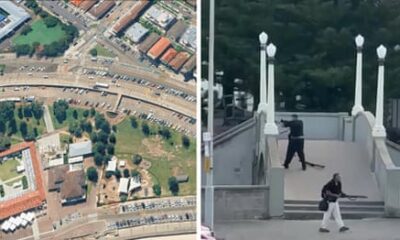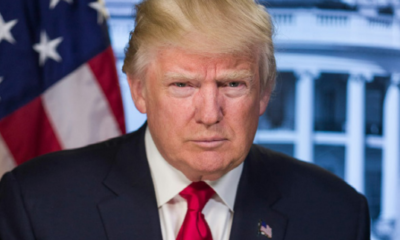Analysis
Tinubu And His Black Beast
On his way to Equatorial Guinea, Tinubu rode in a gleaming new car to the airport, leaving tongues wagging. A glamorous, armoured black Cadillac Escalade reminded many of the NPN days. Such a show of opulence in the immediate aftermath of the hunger protests seemed an act of defiance. He startled the public.
Tinubu preaches austerity, but makes no effort to curtail lavish public expenditure. A commentator said the car was the hardest evidence of his aloofness. But more patriotic people may argue that a man who leads 200 million people and who has just secured a vote of confidence from the people that matter is at liberty to thump his nose at disgruntled elements. Other patriots may argue that the president of the Giant of Africa cannot move around like a lizard, in a jalopy, just because of hunger in the land. The president’s aides, who always find sinisterness in every criticism of their principal, might soon release data on world leaders’ use of exotic cars. They won’t see the disconnect between what they preach and what they practice.
Read also : “President Tinubu Travels to France Amidst Nigeria’s Petrol Scarcity and Food Inflation Crisis”
If Tinubu didn’t impose hardship on the people, this penchant for luxury might have been pardonable. After all, a man who had dreamed of being president for many years must have developed a ton of fantasies along the way. So, if he promised himself he would change the national anthem to cure nostalgia and ride in a new car that shares a fleeting resemblance with that used by American presidents, shouldn’t we indulge him? But since his inauguration, in all his public addresses to the nation, the president has urged perseverance and understanding. In his last address during the protests against bad governance, he demanded sacrifice and patience from citizens to save the country from economic ruin. How ca the public understand this blatant hypocrisy?
Rather than lead by personal examples, the president and his men have continued with the routine lavish lifestyles of our politicians. The inflation rate has burnt jobs and livelihoods, but hasn’t stopped the president from acquiring a brandnew jet for his travels. Now, he has a new armoured Chairman Escalade, as they call it. For a country saddled with impossible debts, a car wouldn’t worsen our predicament, but it would send the message that the redemptive belt-tightening hasn’t begun.
In Nigeria, progressivism has been reduced to blind sentimental loyalty to a political leader who identifies or masquerades as a progressive, particularly one who once participated in pro-democracy activities. A progressive is no longer a person who champions social reforms. So, some of these other progressives actually think that the public focus on a new car is nonsensical pedantry by bad losers. In other words, since Tinubu is a rich man, we must allow him to enjoy the cushioned life of the rich while he is president.
In essence, why are we disturbed by a mere car when a corrupt president can move around in a rickety bolekaja while stealing the country blind? So, to critics who wonder why the prescription of sacrifice is good for the masses and not the president, these fans of Tinubu will say that Tinubu is being transparent and honest by ‘doing his little doings’ in the open. These folks aren’t bothered by manifest policy incongruencies. He runs a bloated cabinet, but wants people to curb their appetites. He wants the people to use Made-In-Nigeria goods, but he spurns the chance to lead the transformation by personal example at every opportunity.
In times past, some military heads of state decreed that all government officials, including the president, must use Peugeot cars, which were then assembled in Nigeria. While these symbolic gestures didn’t stop the rampant embezzlement of public funds, they showed that the government was conscious of the people’s predicament and could at least pay lip service to it. Such symbolic gestures made the people feel their military leaders were not altogether foreign conquering mercenaries. Even military juntas who weren’t answerable to anyone cared about optics and made some effort, even if superficial, to show empathy. Why, then, do our elected leaders grate the sensibilities of the frustrated and famished masses with their exhibition of sybaritism?
Since Tinubu’s black beast became the talk of the town, many youths have besieged the internet to find out the cost. A few government officials who now regard peaceful protests against bad governance as subversive might think of this new virulent inquisitiveness as rascality. They would rather have a docile citizenry that defers sheepishly to its leaders and their wanton profligacy and waits patiently till the elections to voice their concerns. The tragedy is that many citizens are now disillusioned and losing faith.
Apathy and anomie are spreading. The youths are increasingly feeling that our national problems are refractory and only those who can’t japa are staying behind. Rife rumours put the cost of the president’s beast at about a billion Naira. Only a few can understand why the president removed the petrol subsidy only to buy a new jet and car for himself when the country’s economy is still in peril. A cost-conscious and empathetic president would have seen out his first term in demonstrable personal austerity, but Tinubu perhaps thinks his comfort will quicken national recovery.
It isn’t easy to imagine what the president feels and tells his closest aides behind closed doors. It must be arduous churning out justifications for this hypocrisy. It’s true the country is badly divided and no longer as safe as it used to be, and therefore, keeping the president safe should be a national priority. But if presidential security rather than comfort is the objective, then why wouldn’t such a paranoid president move around in an armoured personnel carrier like the president of Guinea?
A car might not worsen the penury of rural folks and the slum life of most in the cities, but a new gas-guzzling beast bought with taxpayers’ money and unveiled as hunger protesters were being forced off the streets will provoke public outrage. It’s true Nigeria didn’t become the global headquarters of multi-dimensional poverty and child malnutrition because of Tinubu. It’s true, he inherited a mess and shouldn’t be deprived of the tools and trappings of his exalted office. It’s indeed his turn. But he must remember that what he does is more significant than what he says.
The vice president believes Tinibu has only one wristwatch. Many who have been to Bourdillon, where he lives, say it’s spare. They must be believed, but if the president is not a man of flamboyance and profligacy, why does he struggle to cut a figure of frugality and run a lean government to give people hope? Why has he allowed himself to be embroiled in a damaging conflict of interest mess in the award of huge contracts?
The president must fashion and announce an ambitious vision. With a concise vision, he will find urgency; he will not waste time celebrating trivial achievements or indulge himself in fantasies. With a vision, he can sculpt the size, attitude and morality of the government he requires for the mission.
Analysis
Insecurity: Defence, Development, and Duty, by Alabidun Shuaib AbdulRahman
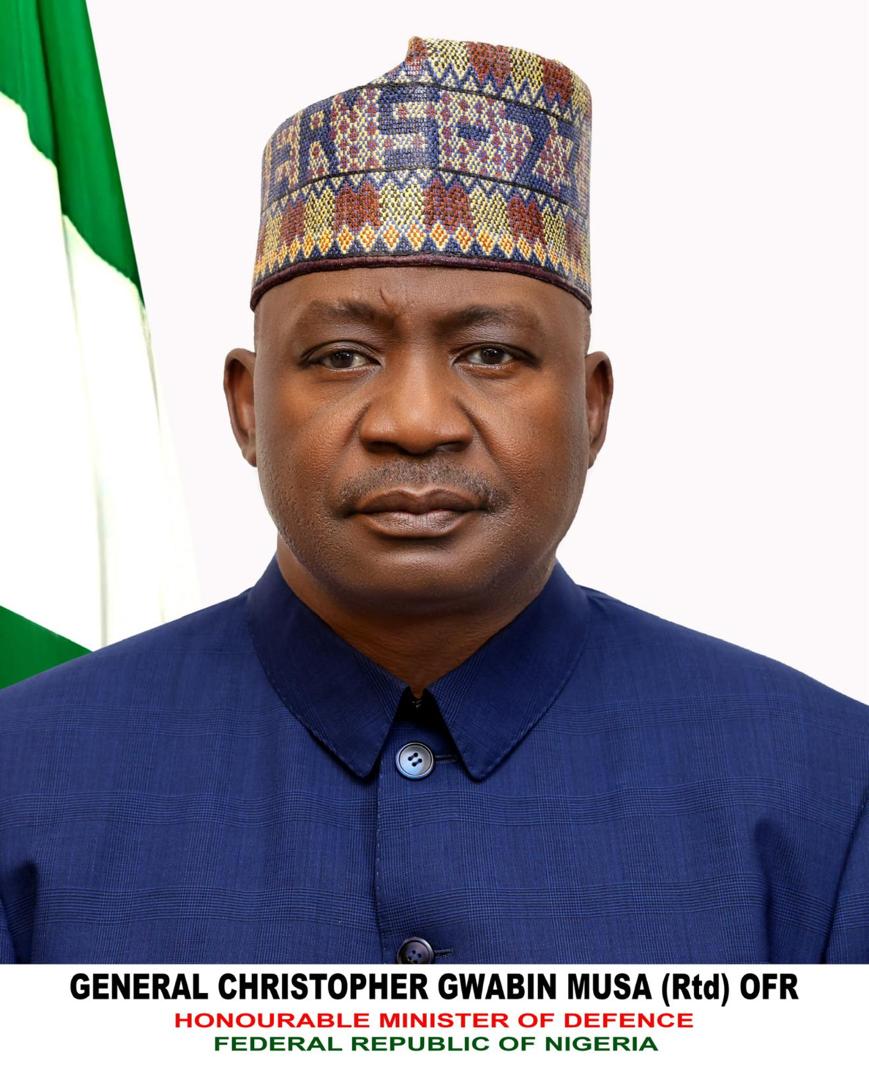
Insecurity: Defence, Development, and Duty, by Alabidun Shuaib AbdulRahman
Last week, this column examined the need for Nigeria to go beyond the symbolic appointment of a Defence Minister and to embrace a more strategic, coherent and results‑oriented national security policy. With the Honourable Minister of Defence, General Christopher Gabwin Musa (rtd) now sworn in and formally at his desk, the expectations of Nigerians have understandably risen. Citizens are no longer satisfied with promises that go unfulfilled, rhetoric without measurable results, or military engagements that deliver ephemeral victories without sustainable impact. The scale of the challenge is immense, and to effectively confront insecurity in all its dimensions requires a realistic blueprint that is rooted in global experience but fully adapted to our domestic realities.
The current insecurity landscape in Nigeria is not confined to a single theatre of operation. It encompasses violent extremism in the Northeast involving Boko Haram and Islamic State West Africa Province (ISWAP) factions; widespread banditry and cattle rustling across the Northwest; mass kidnappings for ransom that have spread into Central and Southern states; maritime piracy and sea robbery; farmers‑herders clashes in the Middle Belt; and criminal syndicates operating along transport corridors. These threats are not isolated, and they share common vectors that exploit governance gaps, economic deprivation, porous borders, and community distrust of state institutions. The sheer breadth of this insecurity crisis has made it clear that conventional, ad hoc responses will not suffice. What Nigeria requires now is a comprehensive, intelligence‑driven approach that integrates defence, internal security, economic development, and community empowerment.
The experience of other countries that have confronted similar threats offers instructive lessons. Nations that have made progress in countering terrorism and organised crime have done so by strengthening intelligence structures, integrating technology into security operations, building trust with local communities, and coordinating interagency responses. The United Kingdom’s counter‑terrorism framework, known as CONTEST, was first developed in 2003 by Sir David Omand at the Home Office in response to the 2001 9/11 attacks. It has been revised in 2006, 2009, 2011, 2018, and most recently in July 2023 to address evolving threats. CONTEST’s four pillars — Prevent, Pursue, Protect and Prepare — aim to safeguard UK citizens and infrastructure. Between 2018 and 2023, nine terrorist attacks were declared in the UK, resulting in six deaths and about 20 injuries, while law enforcement agencies disrupted 39 late-stage terrorist plots before they could be executed. The Counter-Terrorism and Security Act 2019, introduced by then Home Secretary Sajid Javid and receiving Royal Assent on 12 February 2019, further strengthened UK powers at ports, borders, and in counter‑terrorism investigations. These measures reiterate the importance of intelligence integration and pre-emptive action, lessons highly relevant to Nigeria’s own security planning.
Spain’s experience with ETA (Euskadi Ta Askatasuna) provides another instructive example. ETA was responsible for hundreds of deaths over decades before declaring a definitive cessation of armed activity in 2011 and formally dissolving its structure in May 2018. French and Spanish security cooperation played a decisive role in degrading ETA’s networks throughout the 2000s and 2010s, alongside judicial and intelligence reforms after the 2004 Madrid train bombings. Historical estimates attribute between 830 and 857 killings to ETA, illustrating both the human cost of insurgency and the impact of sustained counter-terrorism measures led by state intelligence agencies. Spain’s Ministry of Interior and Counter-Terrorism Intelligence Centre continues to coordinate post-ETA security strategies, reflecting the necessity of ongoing vigilance even after apparent victories.
Saudi Arabia has also demonstrated the impact of a coordinated, high-level counter-terrorism approach. In 2005, the Kingdom hosted the first International Counter-Terrorism Conference in Riyadh, attended by over 55 countries, resulting in the establishment of the United Nations Counter-Terrorism Centre (UNCCT) with Saudi financial support of US$110 million to assist countries in combating terrorism. Further, in February 2014, King Abdullah issued a royal decree reinforcing counter-terrorism measures, stating that participation in extremist or terrorist activities would not be tolerated, reflecting a strong political commitment to national and global security. According to the Global Terrorism Index, Saudi Arabia’s terrorism impact score declined significantly over the past decade, demonstrating the effectiveness of combined intelligence, legislative, and operational measures.
The Global Terrorism Index (GTI), published annually by the Institute for Economics and Peace, provides a reliable benchmark for assessing global terrorism trends. The 2025 GTI reported that 66 countries recorded terrorist attacks in 2024, up from 58 the previous year, indicating the persistent and shifting nature of the threat. The Sahel region accounted for more than half of global terrorism-related deaths, while lone-wolf and extremist-inspired attacks increased in Western countries. These data underline that counter-terrorism outcomes depend on sustained political will, integrated agency action, and community engagement, lessons, again, that are directly applicable to Nigeria.
In Nigeria, security responses have frequently been reactive. Major operations are mounted after attacks have occurred, rather than through proactive disruption of networks and early interdiction of planned activities. To shift this paradigm, the Defence Ministry under General Christopher Gabwin Musa must prioritise the establishment of a National Intelligence Fusion Centre. Such a centre would integrate data from the military, police, Department of State Services, National Security Adviser’s office, customs, immigration, and digital surveillance units into a single analytic platform. This would enable real-time situational awareness, more accurate threat forecasting, and faster decision-making. A national counter-terrorism database accessible to all relevant agencies, with robust legal protections for privacy and civil liberties, would serve as the cornerstone of this integrated architecture.
Border security is another area where strategic emphasis must be placed. Many militant and criminal groups operating in Nigeria exploit porous borders with neighbouring countries. These transnational linkages facilitate the movement of fighters, weapons, contraband, and illicit funds. The Economic Community of West African States (ECOWAS) has recognised this regional dynamic and proposed a 5,000-member standby force to respond rapidly to insecurity across member states at an estimated first-year cost of $2.61 billion. Nigeria must not only support and participate in regional frameworks but must also strengthen its own border control mechanisms. Smart border technologies such as biometric identification systems, integrated customs and immigration databases, and joint patrols with neighbouring states would make significant inroads into restricting unauthorised movements. Additionally, aerial and satellite surveillance over key migratory and smuggling corridors would enhance the country’s ability to detect and intercept threats before they materialise. Stronger border security disrupts the flow of armed groups, weapons, and contraband while protecting economic zones and encouraging lawful trade.
A critical deficiency in Nigeria’s current security approach has been the disconnect between national forces and local communities. In areas affected by violent extremism and banditry, many communities feel abandoned or marginalised. This creates fertile ground for violent actors to gain influence by positioning themselves as protectors or providers of services. The rise of community security networks such as the Civilian Joint Task Force in the Northeast and Amotekun in the Southwest offers a promising model for localised engagement. These groups have provided valuable situational insights, early warning reporting, and rapid response capabilities. But their informal status limits their effectiveness. What is needed is a nationally coordinated framework that formally integrates community security structures into the broader security architecture, with clear legal status, standardised training, dedicated resources, and oversight mechanisms that ensure accountability and respect for human rights. Empowered, community-embedded security actors can act as force multipliers, strengthening the reach of formal security agencies and building trust between citizens and the state.
Technology must be at the heart of Nigeria’s future security efforts. Modern conflicts are increasingly shaped by information, surveillance, and real-time connectivity. Drones, Intelligence Surveillance and Reconnaissance (ISR) platforms, secure communication networks, and artificial intelligence tools for pattern detection can transform the operational footprint of security agencies. For a country with vast territories that are difficult to monitor through ground forces alone, investing in long-endurance drones and satellite imagery agreements would provide crucial surveillance coverage. Integrating AI-enabled systems to analyse movement patterns, social media signals, and financial flows linked to criminal networks can alert authorities to emerging threats before they materialise into attacks. These investments should be accompanied by specialised training for personnel to interpret and act on the data generated by these systems. In this way, technology amplifies human capacity and creates a more agile, responsive defence posture.
Civil-military relations also demand urgent attention like never before. The pattern of military engagements that yield high collateral damage or disregard human rights has undermined public confidence. Nigeria’s military must adopt what is often referred to in strategic circles as a “hearts and minds” approach. This means that operations should be conducted with strict adherence to the rule of law, with proactive measures to minimise harm to civilians, and with structured engagement mechanisms that involve traditional leaders, local influencers, and civil society organisations.
Socio-economic development must be integrated into the security agenda. One of the principal drivers of recruitment into violent groups is the lack of opportunity for youth. Unemployment remains high, especially in regions most affected by insecurity. If young people have little access to quality education, job opportunities, or even a sense of hope for the future, the appeal of violent groups offering financial incentives and a sense of belonging increases. Therefore, national security policy must be coordinated with economic planning. Ministries of Defence, Interior, Youth Development, Finance, and regional development agencies must work with the private sector to design vocational training programmes, micro-enterprise support schemes, agricultural revitalisation initiatives, and infrastructure projects that create sustainable livelihoods in vulnerable communities. Security will not be sustainable where economic despair persists.
Transparency and accountability in the security sector are also essential. Nigerians are weary of high defence budgets that appear disconnected from tangible results. Defence spending must be accompanied by transparent reporting, independent oversight, and measurable performance outcomes. The creation of parliamentary defence committees with access to classified expenditure details has precedent in mature democracies and can be adapted to Nigeria’s context. Civil society organisations, human rights bodies, and the media must be permitted, within legal frameworks, to scrutinise defence policies and operations. When citizens see that resources are managed responsibly and that abuses are addressed decisively, trust in the security apparatus increases, and cooperation improves.
Nigeria’s role in regional security cooperation cannot be overstated. The threats that afflict the country are not confined to its borders. Maritime piracy in the Gulf of Guinea, cross-border banditry, extremist networks with regional affiliates, and smuggling syndicates operate across national frontiers. Nigeria must lead, not only in rhetoric but in structured collaborative action through regional bodies such as ECOWAS and the African Union. Joint training programmes, intelligence sharing agreements, coordinated patrols, and unified response protocols can dramatically improve collective capacity to deal with transnational threats. However, such cooperation must be accompanied by clear understanding of command responsibilities, funding mechanisms, and the primacy of human rights in operational engagements.
Within the next twelve to twenty-four months, a well-executed security blueprint based on the principles outlined can deliver measurable improvements. Reduced terror-related fatalities, fewer mass kidnappings, restored confidence in security forces, and renewed economic activity in previously conflict-impacted areas would serve as tangible indicators of progress. Most importantly, strengthened cooperation between federal and state security agencies and enhanced trust with communities will lay the foundation for longer-term stability.
Nigeria stands at a crossroads. The Defence Ministry now has the opportunity to transform the nation’s security architecture, not through isolated campaigns or fleeting headlines, but through a sustained, integrated, people-centred strategy. Ending insecurity in Nigeria is not merely a Defence Ministry task. It is a national imperative that demands political will, inter-governmental coordination, community partnership, and structural reform. The people of this country deserve not merely promises but results. It is time for leadership that does more than respond to insecurity; it is time for leadership that contains, mitigates, and ultimately overcomes it. Nigeria’s future depends on it.
Analysis
Perennial Coups in Africa, by Boniface Ihiasota
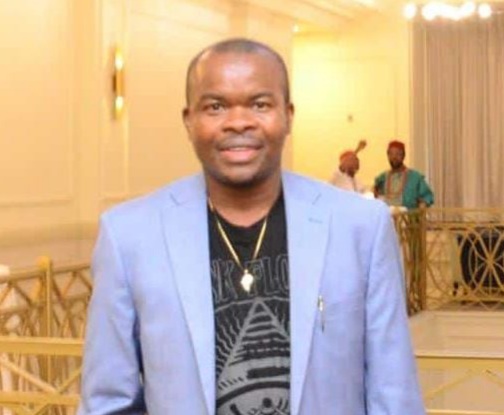
Perennial Coups in Africa, by Boniface Ihiasota
Africa’s post-independence path has often been marred by abrupt disruptions of democratic order, with coups becoming a recurrent and, tragically, almost predictable phenomenon. The recent events in Benin reaffirm that this spectre remains alive. On 7 December 2025, a group of soldiers appeared on state television declaring they had seized power, dissolved national institutions, suspended the constitution, and closed the country’s borders. Yet the attempt was thwarted when loyalist forces regained control, with the government’s Interior Minister confirming the coup had been foiled.
This near-coup in Benin is not an isolated incident; rather, it is a vivid illustration of a broader pattern that has haunted the continent for decades. Since the 1950s, the tally of coups, both successful and attempted, in Africa outstrips any other region globally. By some estimates, between 1950 and 2023, Africa registered around 220 coup attempts, of which 109 succeeded and 111 failed. At least 45 of the 54 countries on the continent have experienced at least one coup attempt in their postcolonial history.
The persistence of coups in Africa can be traced to deep structural challenges. Weak institutions, fragile rule of law, endemic corruption, economic hardship, and porous civil-military relations often create fertile ground for military interventions. Researchers have consistently noted the imbalance between civilian governance structures and powerful militaries as a recurring factor in the continent’s political instability.
West Africa, in particular, has borne the brunt of this cycle. Between 2020 and 2023 alone, there were nine coups or attempted coups across West and Central Africa, with nations such as Niger, Mali, Burkina Faso, Chad, and Guinea experiencing partial or complete military takeovers.
The attempted coup in Benin stands out because, for many years, the country had been regarded as one of West Africa’s more stable democracies. Since the return to democratic rule in 1991 after nearly two decades of military dictatorship, Benin has regularly held presidential elections every five years. The 2025 attempt, therefore, is both a shock and a wake-up call.
The details surrounding the recent Benin plot are unsettling. According to the state prosecutor in a prior 2024 case, a coup attempt allegedly involved bags containing 1.5 billion CFA francs, approximately 2.5 million U.S. dollars, intended as funds to bribe or mobilize the presidential guard. Those implicated included a former sports minister and a businessman linked to high-level politics.
While not identical to the 2025 mutiny, the previous case indicates deeper undercurrents of elite intrigue and corruption that may feed motivations for a coup. The immediate impact of the failed 2025 attempt will likely be an internal reckoning: increased insecurity, possible crackdowns, and a climate of suspicion, all of which tend to frighten away investors and diminish public trust. But the consequences extend beyond the immediate. Every interruption in democratic order chips away at long-term institution-building and erodes the social contract between state and citizen.
From the diaspora, the frustration is palpable. We watch as our homelands oscillate between hope and despair, innovation and interruption. Our remittances, investments, and prayers for progress are tethered to the fate of countries like Benin. When a fragile democracy nearly falls, it shakes our belief in a stable Africa whose promise we carry with us across oceans and continents. However, beyond despair lies reflection, and perhaps even resolve.
The coup attempt in Benin should serve as a warning that stability cannot be taken for granted and that democracy is not guaranteed but must be actively nurtured and protected.
For Africa to break free from this cyclical fate of coups, governance structures must be strengthened to ensure a robust judiciary, independent electoral bodies, transparent civilian oversight of the military, and accountable intelligence services. Civic education must cultivate vigilant citizens who demand accountability and refuse to normalize unconstitutional transfers of power.
Regional and international solidarity is equally important, supporting democracy through the promotion of governance, human rights, and long-term stability rather than the expediency of short-term interests.
The failed coup in Benin is a moment of reckoning, not only for Benin but for the continent as a whole. Coups may disrupt governments, but they cannot and should not disrupt the enduring spirit of Africa. The long arc of African progress, encompassing democracy, development, and dignity, demands more than periodic elections; it requires strong institutions, integrity, and a citizenry committed to holding power accountable.
The shadow of coups has loomed over Africa for decades, but it is neither immutable nor inevitable. Breaking this cycle demands collective responsibility, unity, and the prioritization of national interest over personal ambition. Only through these sustained efforts can Africa replace the recurrent threat of military takeovers with a horizon of lasting democracy and development, ensuring that the promise of the continent is no longer postponed but fulfilled for generations to come.
Analysis
Beyond A Defence Minister, by Alabidun Shuaib AbdulRahman
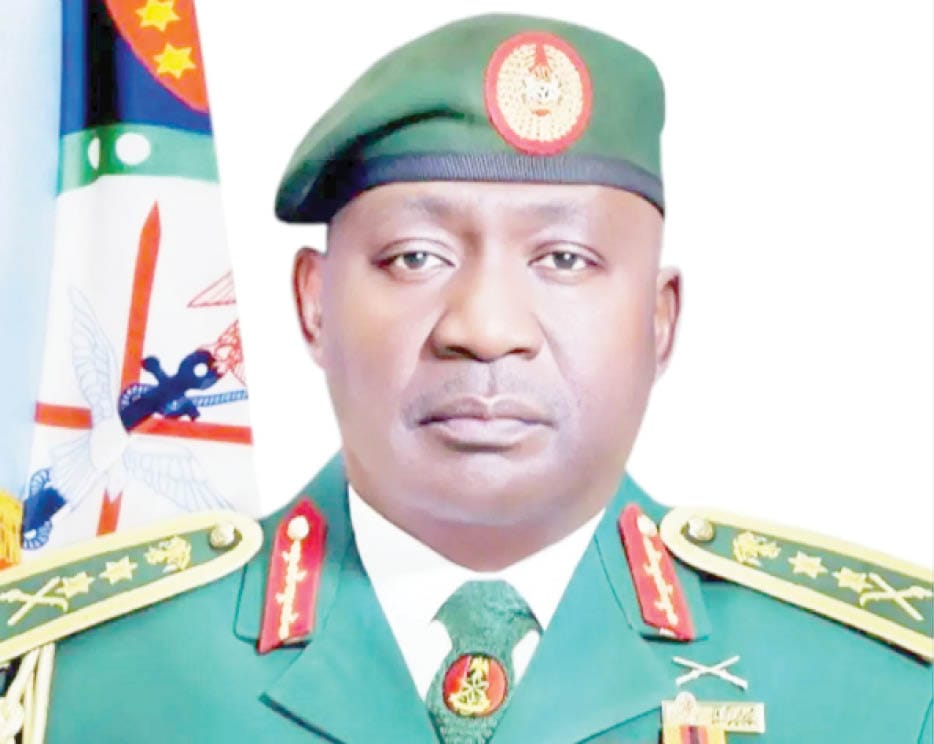
Beyond A Defence Minister, by Alabidun Shuaib AbdulRahman
When the name of General Christopher Gwabin Musa (rtd) was announced as the new Minister of Defence for Nigeria, many citizens did not cheer — they exhaled. In a country where hope often flickers faster than security, each new appointment carries the burden of history. Nigerians are tired of seeing ministers swap titles, while insecurity deepens, kidnappings proliferate, and communities collapse.
To understand the challenge he inherits, one must revisit the history of Nigeria’s Defence Ministry from 1999 onward. The first in the Fourth Republic was retired Lieutenant-General Theophilus Yakubu Danjuma, who assumed office in June 1999 after democracy was restored. Danjuma’s appointment was meant to restore honour and discipline to a military tainted by years of dictatorship. His immediate task was political: reassure Nigerians that the Armed Forces would no longer be politics by another name, and help transition from military rule to civilian governance. He helped steer budgets toward rebuilding and re-equipping, initiating what was then a credible attempt at professionalising Nigeria’s armed forces. But those efforts addressed conventional defence, not the emerging internal threats. Danjuma’s tenure ended in May 2003 with the civilianization of leadership but by then the foundations for internal security challenge management remained shallow.
In July 2003, Rabiu Musa Kwankwaso became Defence Minister under President Obasanjo’s second term, and thus inaugurated an era of civilian political stewardship at the Ministry of Defence. His time, stretching to May 2007, coincided with the earliest stirrings of what would become insurgency. Boko Haram was still marginal, largely ignored by national security architecture focused on external defence. Kwankwaso’s strengths lay in politics and governance, but not in shaping a doctrinal shift toward internal security or insurgency response. The defence ministry under him remained oriented toward traditional armed-forces metrics of equipment, formal deployments, diplomacy while Nigeria lurched toward a reality that required intelligence-driven, community-rooted internal security frameworks.
When Mahmud Yayale Ahmed took over in July 2007 and served until September 2008, the writing was already on the wall. Boko Haram had begun to emerge visibly, yet the response remained bureaucratic. Yayale Ahmed brought civil-service credentials and an administrative mindset, not military temperament. The ministry managed procurement, sustained the flagging morale of the forces after years of underfunding, but did little to evolve institutional capacity for asymmetric threats.
By late 2008 and early 2009, under Shettima Mustapha and subsequently the retired Major-General Godwin Abbe, Nigeria entered what would become its darkest chapter of internal insecurity. In 2009, Boko Haram erupted violently. Abbe, a former soldier turned politician, presided during the crescendo of that crisis. The response was drastic but superficial: raids, crackdowns, mass arrests, but little reckoning with root causes. Communities were ravaged, trust was eroded, animosity deepened between the security forces and civilians. The violence may have been met with force, yet the underlying grievances, intelligence failures and governance vacuums were never addressed. The result was predictable: suppression bred resentment, insurgency morphed and scattered, later to resurge with renewed vigour.
When the baton passed to civilian ministers Adetokunbo Kayode (2010–2011), Haliru Mohammed Bello (2011–2012), and Olusola Obada (2012–2013), Nigeria sank deeper into chronic internal instability. Their tenures focused largely on procurement, revitalizing weapon stocks and administrative reshuffles, rather than systemic overhaul. There were no comprehensive reforms of policing, no robust intelligence-sharing across agencies, no serious investment in community-based early-warning or conflict-prevention mechanisms. Some may have tried to manage manpower, restructure departments or buy equipment, but the enemy had changed: asymmetric war, civilian-targeted violence, kidnapping rings, banditry, communal conflicts. The Ministry remained geared for conventional threats. As a result, Nigeria drifted.
A temporary caretaker period under Labaran Maku (2013–2014) barely registered any shift. Then came a moment of cautious optimism. Aliyu Mohammed Gusau, whose career spanned multiple security and intelligence roles, was appointed Defence Minister in March 2014. His background and reputation suggested a possible turning point: here was a man who understood threats beyond the battlefield. He attempted, in the brief span he held office, to emphasise intelligence coordination, inter-agency cooperation, and reform of structural leakages. But insurgency had already scaled across regions; Boko Haram had splintered, and the patience and capacity were thin. Gusau’s efforts lacked political depth and time. When his tenure ended in May 2015, so too did the hopes of seeing a decisive shift from reactive force to preventive security architecture.
Under subsequent ministers Mansur Mohammed Dan-Ali (2015–2019) and retired Major-General Bashir Salihi Magashi (2019–2023), the tendency again was toward kinetics, procurement, routine operations — heavy-handed responses to terror strikes, bandit raids, kidnappings. The Armed Forces regained some currency; there were operations, there were “victories,” and sometimes media reports of dislodged cells or rescued hostages. But the casualty was strategic consistency. The underlying problems: weak policing institutions, uncoordinated intelligence between state and federal agencies, porous borders, and a civilian security vacuum. Without credible law enforcement reforms, social rehabilitation and community engagement, cleared zones relapsed. Violence remained endemic.
When President Bola Ahmed Tinubu picked Mohammed Badaru Abubakar, a former two-term governor as Defence Minister in August 2023, many hoped that his executive political experience would at last shapeshift national security policy. But reality proved more unforgiving than expectation. By November 2025, Nigeria had witnessed mass kidnappings, schoolchildren abducted en masse, rural communities under siege, and public confidence crumbling. On November 26, President Tinubu declared a nationwide security emergency, ordering mass recruitment into police and army ranks and authorizing new deployments of forest guards to flush out terrorists and bandits from remote hideouts. The aim was to inject manpower; but as many analysts warned, manpower without structural reform is like pouring water into a leaking pot. On December 1, 2025, Badaru resigned reportedly on health grounds.
The very next day, on December 2, President Tinubu nominated retired General Christopher Gwabin Musa as Minister of Defence. Musa had served as Chief of Defence Staff from 2023 until October 2025, when he was relieved in a wide-ranging military shake-up. His record is impeccable: commissioned as Second Lieutenant in 1991 after graduating from the Nigerian Defence Academy, Musa rose steadily through command ranks, served in key operational theatres, including as Theatre Commander in counter-insurgency campaigns and won the Colin Powell Award for Soldiering in 2012.
This appointment represents more than a change of guard; it presents a crossroads. For generations, Nigeria’s Defence Ministry oscillated between procurement-focused bureaucracy and reactive operations. The missing link was always a coherent, nationwide internal security doctrine, one that recognises terrorism, banditry, kidnapping, communal wars and urban criminality as equal or greater threats than cross-border war. Musa may be the man with the credentials; but credentials do not automatically translate to success. For that, he will need more than a uniform, he will need vision, political courage, and structural reengineering.
First, intelligence in Nigeria has long been a patchwork of agencies: military intelligence, police Special Branch, state-level vigilante networks, local community informants, and often unofficial actors. Every Defence Minister since 1999 has inherited this fragmentation. Even when ministers like Aliyu Gusau explicitly prioritized intelligence reform, they lacked either the time, political backing, or institutional leverage to bind these threads into a functional national network. Under Musa, Nigeria must build a real Intelligence Fusion Centre, statutory in law, resourced, and empowered to gather, analyse, and share data across all security agencies. It should not be another office with flowery titles; it must be the beating heart of Nigeria’s security architecture.
Second, Nigeria’s policing and internal security apparatus remain dangerously under-developed. The police are overstretched or mis-deployed; conventional policing capacities are weak; law enforcement is uneven across states or non-existent in many rural areas. In effect, the military ends up policing civilians, a recipe for human rights violations, community alienation, and cycles of violence. Musa must use his credibility both as military man and now Defence Minister to push for statutory police reform, to support state-level policing initiatives, and to redefine roles: the military defends the country externally and responds to exceptional internal crises; the police and civil security agencies maintain daily law enforcement and community protection. That might require political negotiation with governors and lawmakers.
Third, Nigeria must stop treating security as a matter of fire-power and weapons. As urban kidnappings show, and as rural banditry and communal conflicts prove, contemporary insecurity thrives on mobility, networks, subversion, infiltration, and terror. The new minister should prioritise modern security tools: drones for surveillance, communication-intercept (COMINT and SIGINT) capacity, special forces trained in counter-terror, local informant networks, rapid reaction units — small, mobile, intelligence-driven. Big tank brigades and conventional formations have their place; but they are blunt instruments in a country where threats can strike schools at night and vanish into forests by dawn.
Even military brilliance alone will fail if it remains disconnected from society. Nigeria’s security problems are deeply structural: poverty, social dislocation, youth unemployment, weak institutions, poor governance, inter-communal crises, land conflicts, ethnic and religious fractures. Every military advance that does not come with social stabilization — resettlement of displaced persons, rebuilding of schools, reviving of farms and markets, psychosocial support, community reconciliation — simply displaces the problem. The new Defence Minister must insist that security operations be paired with civil-affairs initiatives: resettlement, restoration, rebuilding.
Finally, the Ministry must embrace transparency and result-oriented reporting. For too long, Nigerians have depended on headlines: “Bandits killed,” “Scores of terrorists neutralised,” “Villages liberated.” But those headlines rarely translate into lasting security. The public needs measurable outcomes: fewer kidnappings, fewer mass attacks, safer roads, resettled communities, functioning markets, schools reopened, return of displaced people.
General Musa steps into office at a critical moment: the presidency has just declared a nationwide security emergency; recruitment into police and army forces has been ordered; forest guards are to be deployed, and VIP-protection officers are to be redeployed to frontier duties. These are signals that the government finally acknowledges the scale of the crisis, but manpower without structure is no answer.
If Musa gets it right, this appointment could mark the beginning of a long overdue transformation. If he fails, the nation risks descending deeper into despair: more missing schoolchildren, more displaced families, more ghost towns.
Nigeria does not need another Defence Minister. What Nigeria needs is a Defence Minister who is also an architect of a new national security system: one that integrates intelligence, law enforcement, civil protection, social support, governance and accountability. The war to reclaim Nigeria’s peace is no longer just on the battlefield but in institutions, in policies, in communities, and in hearts.
Gen. Christopher Gwabin Musa (rtd) now carries the weight of that history. If he can convert his military credentials into strategic reforms, if he can lead with vision, then he may offer Nigeria more than hope: a path to security; a chance at peace.













